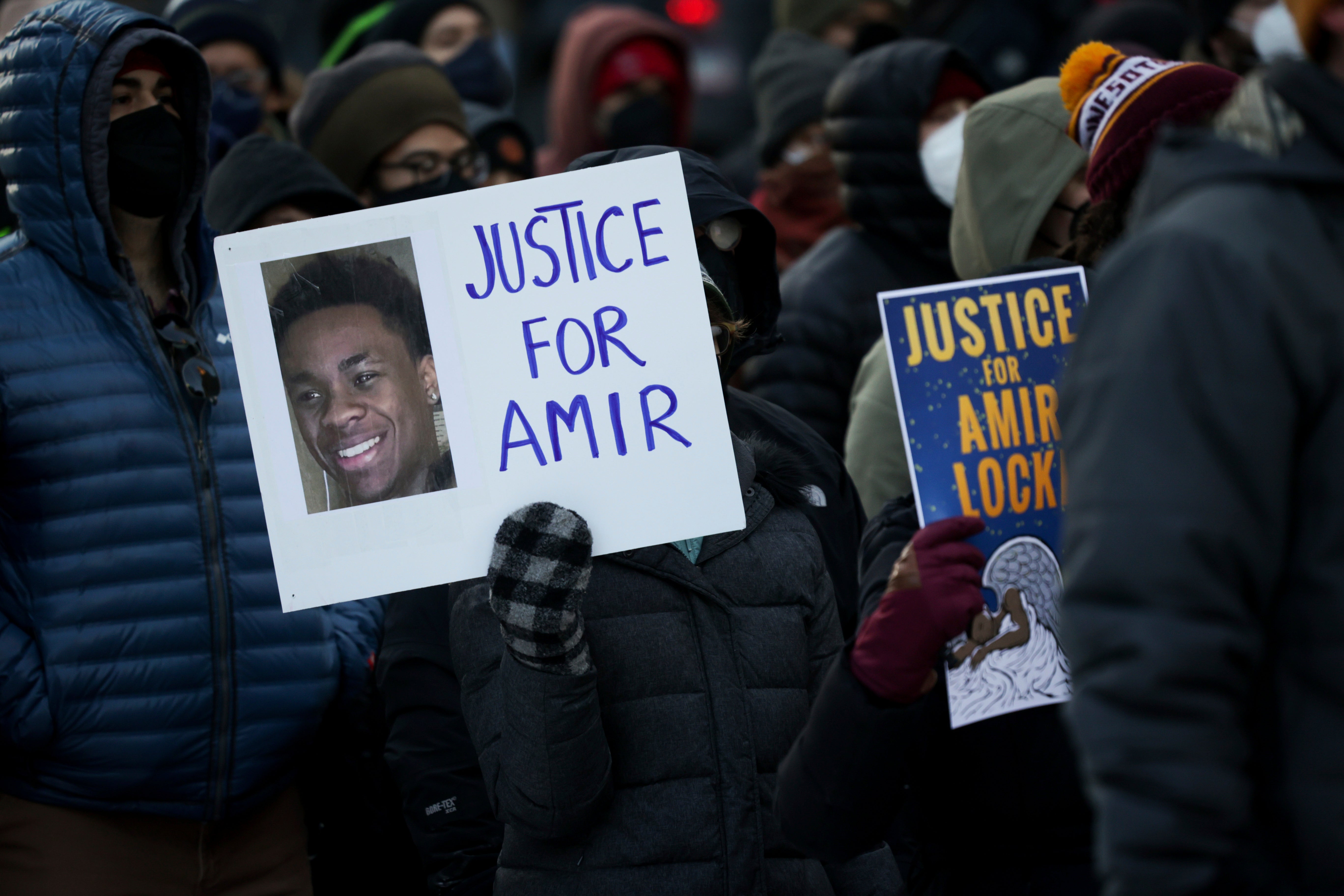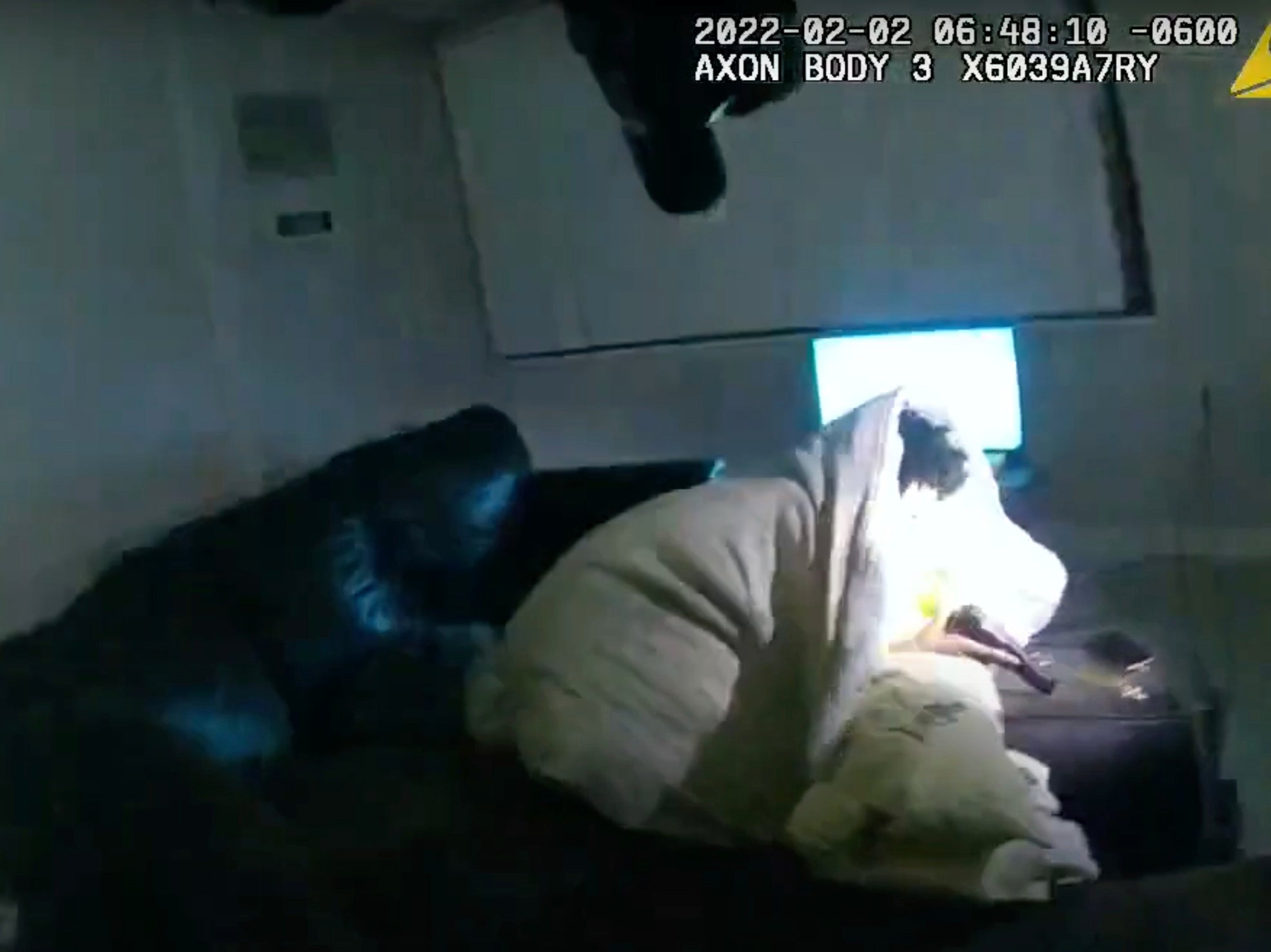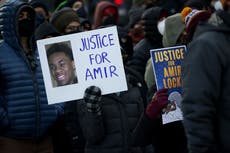Who was Amir Locke, 22-year-old shot dead by Minneapolis police?
Prosecutors declined to file charges against officers who shot and killed Locke when executing a no-knock warrant
Amir Locke, a 22-year-old Black man, was shot and killed by Minneapolis police executing a no-knock warrant during a homicide investigation on 2 February.
Body-camera footage showed Locke sleeping on a couch in a downtown apartment while holding a gun when officers entered unannounced. As he was startled awake, authorities said Locke pointed the gun at the officers and was shot by Officer Mark Hanneman seconds later.
The shooting sparked widespread protests as Locke’s family questioned the police account of what happened.
A review of the case by Attorney General Keith Ellison and Hennepin County Attorney Michael Freeman ended on 6 April with the prosecutors announcing that Mr Hanneman will not face charges because he was deemed justified in firing his weapon.
Here’s what you need to know about Locke:
Locke had concealed carry permit for gun
Two days after the shooting, Locke’s parents, Andre Locke and Karen Wells, said that their son was “executed” by the Minneapolis SWAT team, when they woke him from a deep sleep. They added that he reached in confusion for his gun, for which he had a concealed carry permit, to protect himself.
They described the 22-year-old as respectful, including towards police officers, and said some of their relatives work in law enforcement. Ms Wells said the couple coached their son on how to act and do “what they needed to do whenever they encountered police officers” because of the danger to “unarmed Black males”.
“My son was executed on 2-2 of 22,” Ms Wells said. “And now his dreams have been destroyed.”

A gun-rights group highlighted the timing of the raid, saying it appeared from the video that Locke had been awakened by a confusing array of commands from multiple officers pointing lights and guns at him.
“Mr Locke did what many of us might do in the same confusing circumstances, he reached for a legal means of self-defence while he sought to understand what was happening,” said Rob Doar, a spokesman for the Minnesota Gun Owners Caucus.
Locke family represented George Floyd civil rights attorney
The family hired civil rights lawyer Ben Crump, who also represented the family of George Floyd.
Mr Crump said in a statement that as in “the case of Breonna Taylor, the tragic killing of Amir Locke shows a pattern of no-knock warrants having deadly consequences for Black Americans. This is yet another example of why we need to put an end to these kinds of search warrants so that one day, Black Americans will be able to sleep safely in their beds at night”.
During a press conference, Mr Crump said the family was “just flabbergasted at the fact that Amir was killed in this way” and that they were sickened at how the raid was carried out. They added that he was law-abiding, had no criminal record, and that he had a permit to carry a gun.
“They didn’t even give him a chance,” Mr Crump said, adding that it was shocking that Minneapolis police had not learned from the death of Taylor, who was killed in a botched raid at her home in Louisville, Kentucky, in 2020, leading to calls for an end to no-knock warrants across the country.
Body camera footage of raid released
The video shows Locke on a couch covered by a blanket and holding a gun in the moments before he’s shot by Minneapolis officers.
In the footage, several officers enter the apartment at 6.48am on 2 February using a key, shooting Locke within 10 seconds of entering the home.
When they enter the apartment, the police officers yell “police – search warrant” several times as well as “hands” and “get on the ground”.
One of the officers kicks the couch, and Locke starts to come out from under the blanket holding a firearm. The police officers then fire three rounds, Locke falls to the floor and the video ends.
The bodycam footage was released about 36 hours after the shooting, as the public called for transparency from the authorities over what happened to Locke.
The Minneapolis Police Department has said that Locke aimed the gun “in the direction of officers”.

Locke had two wounds in his chest and one in his right wrist, an incident report said.
Locke wasn’t named in search warrant
Following the release of the video, Interim Police Chief Amelia Huffman confirmed during a press conference that Locke wasn’t named in the warrant, adding that it’s unclear if he’s connected to the homicide investigation.
A search warrant filed by state agents investigating the shooting said the initial warrants “were being executed for a homicide suspect who was apparently located” at the apartment building where the shooting took place.
Chief Huffman said the officer who shot Locke was in a difficult position.
“The still shot shows the image of the firearm in the subject’s hands, at the best possible moment when the lighting was fully on him. That’s the moment when the officer had to make a split-second decision to assess the circumstances and to determine whether he felt like there was an articulable threat, that the threat was of imminent harm, great bodily harm or death, and that he needed to take action right then to protect himself and his partners,” she said.
“These events unfold in seconds but the trauma is long-lasting. A young man lost his life, and his friends and family are in mourning,” she added.
Prosecutors decline to file charges
More than two months after the shooting, Minnesota prosecutors announced they would not be pressing charges over Locke’s death on 6 April.
“There is insufficient admissible evidence to file criminal charges in this case. Specifically, the State would be unable to disprove beyond a reasonable doubt any of the elements of Minnesota’s use-of-deadly-force statute that authorizes the use of force by Officer Hanneman,” Minnesota Attorney General Keith Ellison and Hennepin County Attorney Michael Freeman said in a joint statement.
The announcement came a day after Minneapolis Mayor Jacob Frey extended his immediate moratorium on no-knock warrants by formalising a new policy that will take effect Friday requiring officers to knock and wait before entering a residence. Some lawmakers also have been pushing for a statewide ban on no-knock warrants, except in rare circumstances.
In their statement, Mr Ellison and Mr Freeman said the Locke case shows that no-knock warrants are “highly risky” and can pose “significant dangers” to people who aren’t engaged in criminal activity.
“Local, state, and federal policy makers should seriously weigh the benefits of no-knock warrants, which are dangerous for both law enforcement and the public alike. Other cities, like Saint Paul, and some states, have ended the use of no-knock warrants entirely,” they said.
“Amir Locke is a victim. This tragedy may not have occurred absent the no-knock warrant used in this case.”


Bookmark popover
Removed from bookmarks